- Home
- Peter S. Beagle
My Son Heydari and the Karkadann
My Son Heydari and the Karkadann Read online
Praise for Peter S. Beagle
“One of my favorite writers.”
—Madeleine L’Engle, author of A Wrinkle in Time
“Peter S. Beagle illuminates with his own particular magic such commonplace matters as ghosts, unicorns, and werewolves. For years a loving readership has consulted him as an expert on those hearts’ reasons that reason does not know.”
—Ursula K. Le Guin, author of A Wizard of Earthsea and The Left Hand of Darkness
“The only contemporary to remind one of Tolkien.”
—Booklist
“Peter S. Beagle is (in no particular order) a wonderful writer, a fine human being, and a bandit prince out to steal readers’ hearts.”
—Tad Williams, author of Tailchaser’s Song
“It’s a fully rounded region, this other world of Peter Beagle’s imagination.”
—Kirkus
“[Beagle] has been compared, not unreasonably, with Lewis Carroll and J. R. R. Tolkien, but he stands squarely and triumphantly on his own feet.”
—Saturday Review
“Not only does Peter Beagle make his fantasy worlds come vividly, beautifully alive; he does it for the people who enter them.”
—Poul Anderson, author of The High Crusade
“Not only one of our greatest fantasists, but one of our greatest writers, a magic realist worthy of consideration with such writers as Márquez, Allende, and even Borges.”
—The American Culture
“Before all the endless series and shared-world novels, Beagle was there to show us the amazing possibilities waiting in the worlds of fantasy, and he is still one of the masters by which the rest of the field is measured.”
—Lisa Goldstein, author of The Red Magician
“Peter S. Beagle would be one of the century’s great writers in any arena he chose.”
—Edward Bryant, author of Cinnabar
Praise for In Calabria
“Acclaimed fantasist Beagle (Summerlong) sets this charming, lyrical tale of unicorns and love on a poor little hillside farm in the toe of boot-shaped Italy, where 47-year-old Claudio Bianchi scratches out a meager existence for himself, old dog Garibaldi, goat Cherubino, three cows, a pig, and three cats. Claudio writes poetry, too, and one day a golden-white unicorn appears to him as a gentle reminder of the freedom animals and humans have lost. The unicorn becomes the one miracle of Claudio’s life—and the ultimate tourist attraction. He protects her as best he can from hordes of reporters, television crews and helicopters, animal rights activists, yearning yokels, and even the Calabrian ’Ndràngheta mob. After Claudio helps the unicorn deliver her colt, his heart, frozen by an earlier tragedy, warms to Giovanna, the intrepid 20-ish sister of the postman. Neatly playing the strictures of Claudio’s simple rural life against the shimmering wildness of the unicorn, Beagle’s kindly fable shows how a man who seems to have nothing can really have everything—with just a touch of magic.”
—Publishers Weekly
“A novella about love in a world of hardship, loss, magic, and recovery. Beagle’s unicorns have never been more bewitching, impossible, and genuine. I cherished every page.”
—Gregory Maguire, author of Wicked and After Alice
“For me, Peter S. Beagle is one of the essential voices in American literature, so essential that I approach each new book he writes not only with excitement but also with trepidation. Can he possibly do it again? Today I read In Calabria from cover to cover. He does it again.”
—Kevin Brockmeier, bestselling author of The Brief History of the Dead
“Peter S. Beagle is a master of the magical, but also of the little details of day to day existence that root his characters in the soil, sweat and everyday breezes of their worlds, and make the magical all the more magical when it touches them. It’s deep and powerful magic that stirs things to life in the gentle fable of In Calabria, but what it stirs—greed, peril, beauty, grief, love, publicity, sorrow, poetry and more—are very much matters of the human heart. Beagle once again explores the magic within us and the magic around us, and does it in unmatched style.”
—Kurt Busiek, author of Astro City and The Avengers
“Peter Beagle weaves his trademark magic deep in the Italian countryside, using threads of the everyday and the fantastical: poetry and pigs, Mafia bosses and terrible beauty, love and rage, the sacred born of the profane. In Calabria holds the power to transform, like the touch of the unicorn at its heart.”
—Laurie R. King, author of the Mary Russell series
“What a wondrous gift it is to have a new unicorn story from Peter S. Beagle! In Calabria is both elegant and earthy, with a slow build of wonder, and then tension, and then growing dread that propels the reader inexorably toward the miraculous conclusion. Once again Peter Beagle demonstrates why he is one of the greatest fantasy writers of all time!”
—Bruce Coville, author of The Unicorn Chronicles
“In Calabria is a gorgeous story shaped with elegant prose and stunning imagery . . . It is a unicorn story. It is a coming of age story. It is a story of forgiveness and a story of love. In Calabria will speak to each and every reader that ventures through its pages.
—So Many Books, So Little Time
“Beauty, imagination, poetry and magic . . . Beagle has that rare gift – the ability, within just a few words, to transport the reader completely into his universe, making the unfamiliar become vividly real. 10/10 stars.”
—Starburst
Praise for Summerlong
“Peter Beagle’s novel Summerlong is a lovely, tantalizing read that moves through a finely detailed, familiar world into a tale as old and as urgent as language.”
—Patricia A. McKillip, author of The Riddle-Master of Hed and Dreams of Distant Shores
“Bestseller fantasist Beagle crafts a tantalizing picture of an atypical Pacific Northwestern couple whose lives are interrupted by myth and mystery. . . .”
—Booklist
“Summerlong is beautiful in its love for our messy complexity; for the first step into cold water, for the death that lets us grow again, and the ways we learn to love each other—and ourselves—wiser and better.”
—Leah Bobet, author of An Inheritance of Ashes and Above
Praise for The Last Unicorn
“The Last Unicorn is the best book I have ever read. You need to read it. If you’ve already read it, you need to read it again.”
—Patrick Rothfuss, author of The Name of the Wind and The Wise Man’s Fear
“Almost as if it were the last fairy tale, come out of lonely hiding in the forests of childhood, The Last Unicorn is as full of enchantment as any of the favorite tales readers may choose to recall . . . a delicate, sensitive, yet powerful rendering of all the intangibles that make a fairy tale unforgettable.”
—St. Louis Post-Dispatch
“The Last Unicorn is one of the true classics of fantasy, ranking with Tolkien’s The Hobbit, Le Guin’s Earthsea Trilogy, and Lewis Carroll’s Alice in Wonderland. Beagle writes a shimmering prose-poetry, the voice of fairy tales and childhood.”
—Amazon.com
Also by Peter S. Beagle
Fiction
A Fine & Private Place (1960)
The Last Unicorn (1968)
Lila the Werewolf (1969)
The Folk of the Air (1986)
The Innkeeper’s Song (1993)
The Unicorn Sonata (1996)
Tamsin (1999)
A Dance for Emilia (2000)
The Lsst Unicorn: The Lost Version (2007)
Strange Roads (with Lisa Snellings Clark, 2008)
Return: and Innkeeper's World Story (2010)
Summerlong (2016)
/>
In Calabria (2017)
Short story collections
Giant Bones (1997)
The Rhinoceros Who Quoted Nietzsche and Other Odd Acquaintances (1997)
The Line Between (2006)
Your Friendly Neighborhood Magician: Songs and Early Poems(2006)
We Never Talk About My Brother (2009)
Mirror Kingdoms: The Best of Peter S. Beagle (2010)
Sleight of Hand (2011)
Nonfiction
I See By My Outfit: Cross-Country by Scooter, an Adventure (1965)
The California Feeling (with Michael Bry, 1969)
The Lady and Her Tiger (with Pat Derby, 1976)
The Garden of Earthly Delights (1982)
In the Presence of Elephants (1995)
As editor
Peter S. Beagle’s Immortal Unicorn (with Janet Berliner, 1995)
The Secret History of Fantasy (2010)
The Urban Fantasy Anthology (with Joe R. Lansdale, 2011)
The Unicorn Anthology (forthcoming ebook with Jacob Weisman, 2017)
The New Fantasy (forthcoming with Jacob Weisman, 2017)
My Son Heydari and the Karkadann
Peter S. Beagle
My Son Heydari
and the Karkadann
Tachyon Publications
San Francisco
My Son Heydari and the Karkadann
Copyright © 2017 by Peter S. Beagle
This is a work of fiction. All events portrayed in this book are fictitious, and any resemblance to real people or events is purely coincidental. All rights reserved, including the right to reproduce this book or portions thereof in any form without the express permission of the author and the publisher.
Cover design by Elizabeth Story
Interior design by James DeMaiolo
Tachyon Publications LLC
1459 18th Street #139
San Francisco, CA 94107
www.tachyonpublications.com
[email protected]
Series Editor: Jacob Weisman
Project Editor: Jill Roberts
E-book ISBN: 978-1-61696-28-5
First E-book Edition: 2017
No, they are vanishing now, the karkadanns; at least they are almost gone from this part of Persia. Which is a very good thing, and you’ll find no one in the land to tell you otherwise. It is an especially good thing for a man master of the only working elephant herd north of Baghdad. If your business is felling trees and hauling them off to the river, to be rafted downstream to the lumber mill and turned into palaces, ships, furniture, what you will—then you are almost bound to come to me and my elephants. It has been my family’s trade for four generations, and myeldest son, Farid, will make the fifth when I am gone. It is our place in the world. It is what we do.
And it is only in this generation—my generation—that we have found ourselves increasingly free of those monsters, those terrible horned demons, the karkadanns. You have never seen one, I assume? No, not likely, coming from Turkey as you do. All the same, you must surely have heard that they are huge creatures, easily the size of Greek bulls, with double hooves, tails like lions, hides like thick leather plates—and that horn! Six, even seven feet long they run; and with the power of that great body behind it, they can splinter a cedar or an oak into kindling. I saw it happen just so when I was a boy.
That same horn can also split an elephant like a dumpling. I have seen that happen too.
Why karkadanns hate elephants as particularly and intensely as they do, no scholar has ever been able to explain, not to my satisfaction. I still have nightmares about seeing two karkadanns charging down out of the hills they favor, bellowing that chilling challenge of theirs—like battle horns, only deeper, and with a more carrying tone—and watching helplessly as they went through my herd, slashing left and right, literally spitting elephants on their horns like kebabs, then hurling them aside and going on to the next poor picketed beast. The elephants almost never fought back, never even tried to run away. Elephants are very intelligent, you know, and perhaps their imaginations simply paralyzed them: they could see what was going to happen, see it so clearly that they could not move. I felt the same way, watching those karkadanns coming.
They trample farmers’ fields too, without a thought, most especially during the mating season. The farmers plant extra crops for just that reason, hoping to salvage something after the beasts get through with their wheat or their corn, their arbors or their orchards. And as for guards—if you can hire any—or dogs, if you can keep them from tucking tail and fleeing at the first distant smell of a karkadann . . . well, why even discuss it? We lost men too, in those old days, as well as elephants.
The karkadann has no natural enemies. I am told that a thousand years ago, the dragons kept them within reasonable check; but, of course, in our human wisdom, we killed off the dragons in the egg and the nest, because they cost us a lamb or a goat now and again. So—of course—the karkadanns promptly ran wild, and we could only be grateful that at least they were not carnivores, like the dragons. That was our sole blessing, for all those thousand years.
No, we did have one thing else to thank the gods for in our prayers: the fact that karkadanns never drop more than one foal at a time. As many as two . . . no, it doesn’t bear considering. Two to a birth, and they would own the country by this time. And other lands too, perhaps—who knows?
They are entirely vegetarian—though their two curving fangs imply otherwise—and entirely solitary by nature, except for those few weeks when they run mad with lust, and are then very nearly as likely to attack one another as they are elephants or humans. Even the females can be badly hurt during the rut; and more than once I have been gratified to encounter a pack of jackals feasting on the carcass of a karkadann bearing the marks of a comrade’s brutal assault. All in all, an unlovely, unadmirable, and altogether detestable creature. And your fascination with it is a complete mystery to me.
But it would not be so to Heydari, my third son. You will meet him at dinner, Farid being away on business. Which is a pity, because I would like you to observe the difference between them. Farid is me in large, as you might say, being that much bigger and that much more ambitious—though not yet that much cleverer, though he thinks he is. I do not always like him, I suppose—do you like all your children all the time?—but I understand him, which is a comfort and a reassurance, and makes for a peaceful association. But Heydari. That Heydari.
You would never take them for brothers if you met them together. Heydari is small and slight, and much darker than Farid, and much less immediately charming. I think he makes a point of it, having seen Farid making friends everywhere, instantly, all his life. He has never been any use with the elephants, and we would be out of business in a month if I put him in charge of my accounts. Yet he is more intelligent than Farid—quite likely more intelligent than all the rest of us—but I cannot see that it has thus far done him much good. All the same, I confess to a feeling for him that I can neither explain nor defend. Especially not defend, not after the time he saved the life of a bloody karkadann.
How old was he? Thirteen or fourteen, I suppose; when else would you be that stupid, in exactly that way? As he told it in his own time—long after he should have told it—he found the creature high in those same foothills you came through, being drawn to it by the urgent calling of a ringdove; which, for reasons no one has ever fathomed, is the karkadann’s only friend. As curious as any boy, he climbed after the bird and followed it to the entrance of a cave, where the beast lay bleeding its life away, and good riddance, through several deep wounds on its throat and flanks. It was barely breathing, he said, and the yellow eyes it tried to focus on him were seeing something else.
Like any man in this realm—any man but my son—I would either have helped the miserable monster on its way, or merely sat myself down and savored its passing. But not Heydari, not my softhearted, softheaded boy. He immediately set about fetching the karkadann wate
r from a nearby spring, going back and forth to carry it in his cap. Apart from the stupidity of it, it was a risky matter as well, for the creature was in pain, and it lunged at him more than once with the last of its strength. He treated its injuries with what herbs he could find, and bound them with strips torn from his own clothes, while the ringdove perched on that murderous horn, cooing its approval. Then he went away, promising to return on the following day, but certain that he would find the karkadann dead when he did. I have said that he has never been of any practical use with the elephants, but he has been a kind boy from his childhood. An idiot, but always kind.
Well, he did return, keeping his word; and, unfortunately, the wretched beast was living yet. It was still unable to raise more than its head— which it did mostly to snap at him, even with one of those wicked fangs broken off halfway—but its wounds had stopped bleeding, and its breath was coming a bit deeper and more steadily. My son was greatly encouraged. He brought it more water, and fetched an armload or two of the fruits and vines that karkadanns favor, laying it all within reach in case the creature’s appetite should revive. Then he sat close beside it, because he is a fool, and recited the old, old prayers and sutras most of the night before he went home.
And climbed back up the next day, and the day after that, to attend to that vile animal’s recovery. Mind you, he told us, his own family, nothing of this—which, I must say, was the first intelligent thing he had done in the whole mad business. As many losses as we had endured over the years, in terms not merely of dead elephants, but taking into account the cost of workers, of lost time and equipment and the timber itself, we would all probably have fallen upon him and torn him to shreds. To be nursing a karkadann back to health, in order that it might continue slaughtering, destroying . . . you see, even now I am sweating and snarling with rage at my own son. Even now.

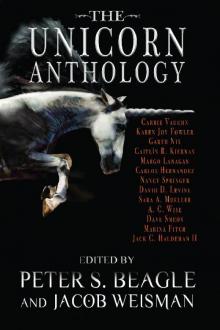 The Unicorn Anthology.indb
The Unicorn Anthology.indb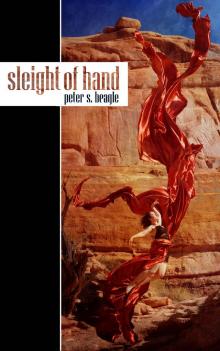 Sleight of Hand
Sleight of Hand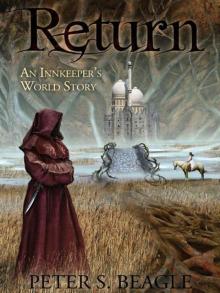 Return
Return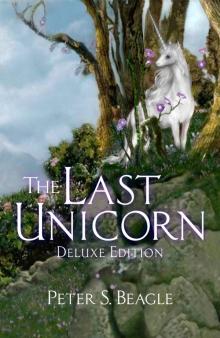 The Last Unicorn
The Last Unicorn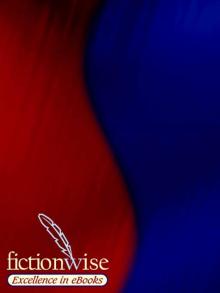 Two Hearts
Two Hearts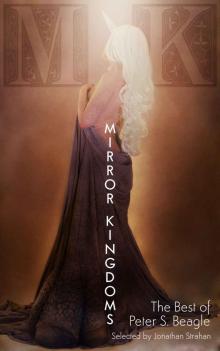 Mirror Kingdoms: The Best of Peter S. Beagle
Mirror Kingdoms: The Best of Peter S. Beagle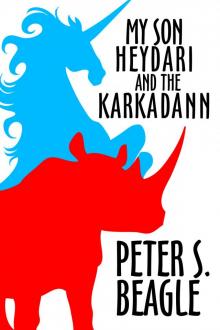 My Son Heydari and the Karkadann
My Son Heydari and the Karkadann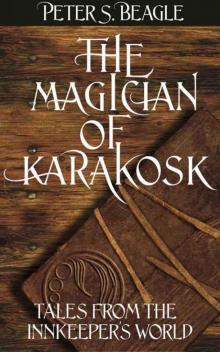 The Magician of Karakosk, and Other Stories
The Magician of Karakosk, and Other Stories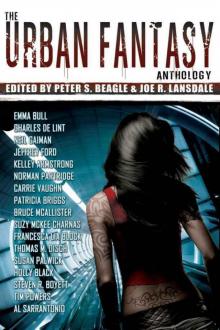 The Urban Fantasy Anthology
The Urban Fantasy Anthology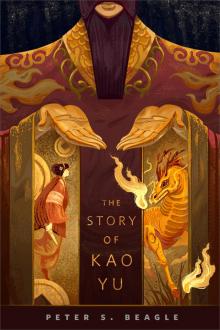 The Story of Kao Yu
The Story of Kao Yu The Karkadann Triangle
The Karkadann Triangle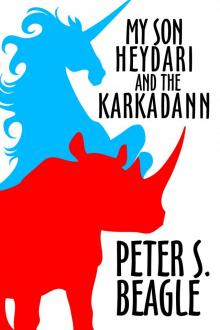 My Son and the Karkadann
My Son and the Karkadann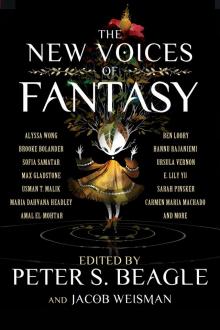 The New Voices of Fantasy
The New Voices of Fantasy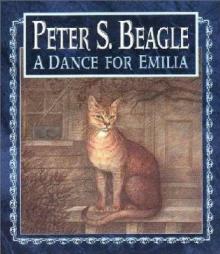 A Dance for Emilia
A Dance for Emilia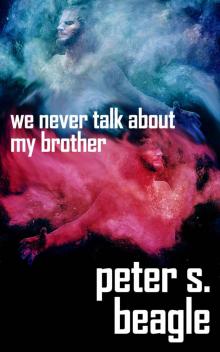 We Never Talk About My Brother
We Never Talk About My Brother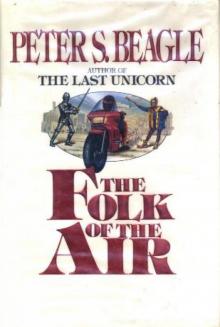 The Folk Of The Air
The Folk Of The Air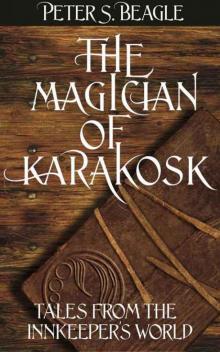 The Magician of Karakosk: Tales from the Innkeeper's World
The Magician of Karakosk: Tales from the Innkeeper's World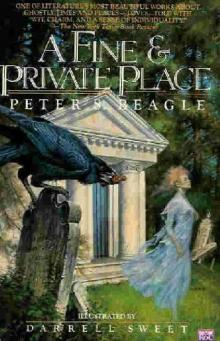 A Fine and Private Place
A Fine and Private Place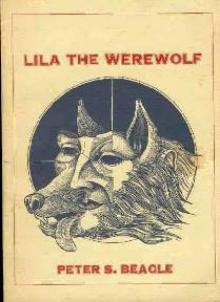 Lila The Werewolf
Lila The Werewolf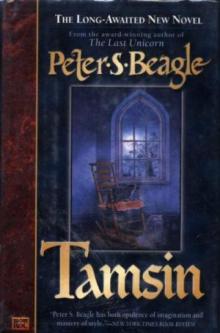 Tamsin
Tamsin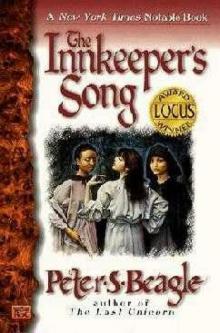 Innkeeper's Song
Innkeeper's Song